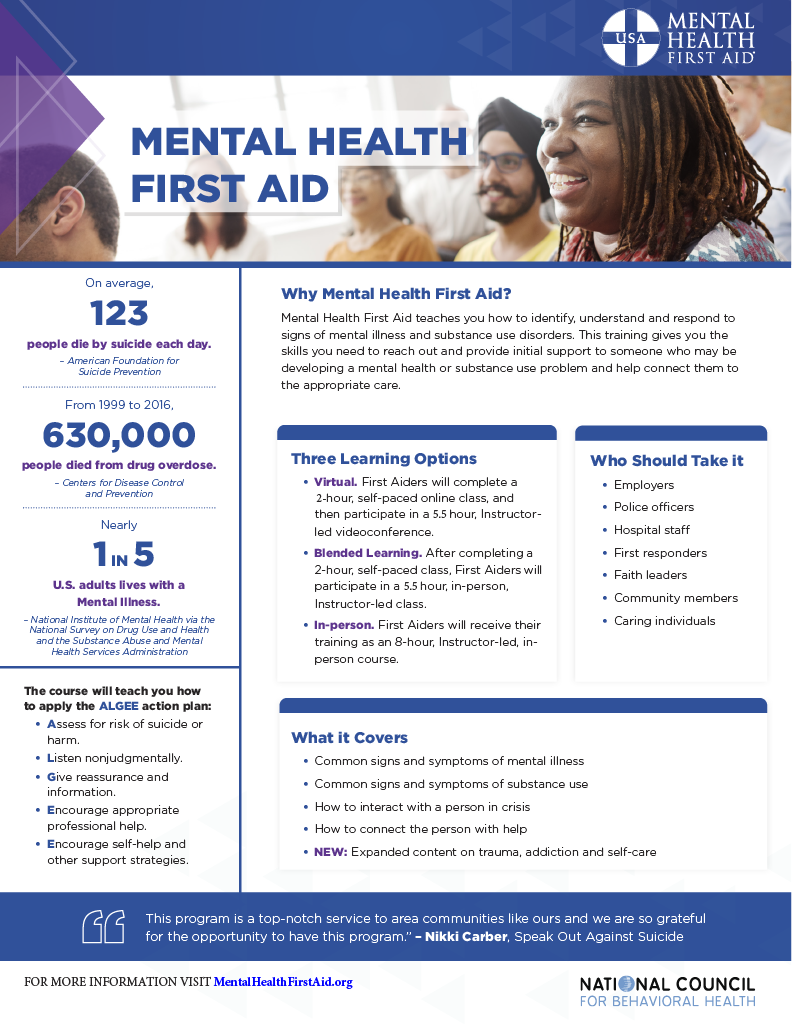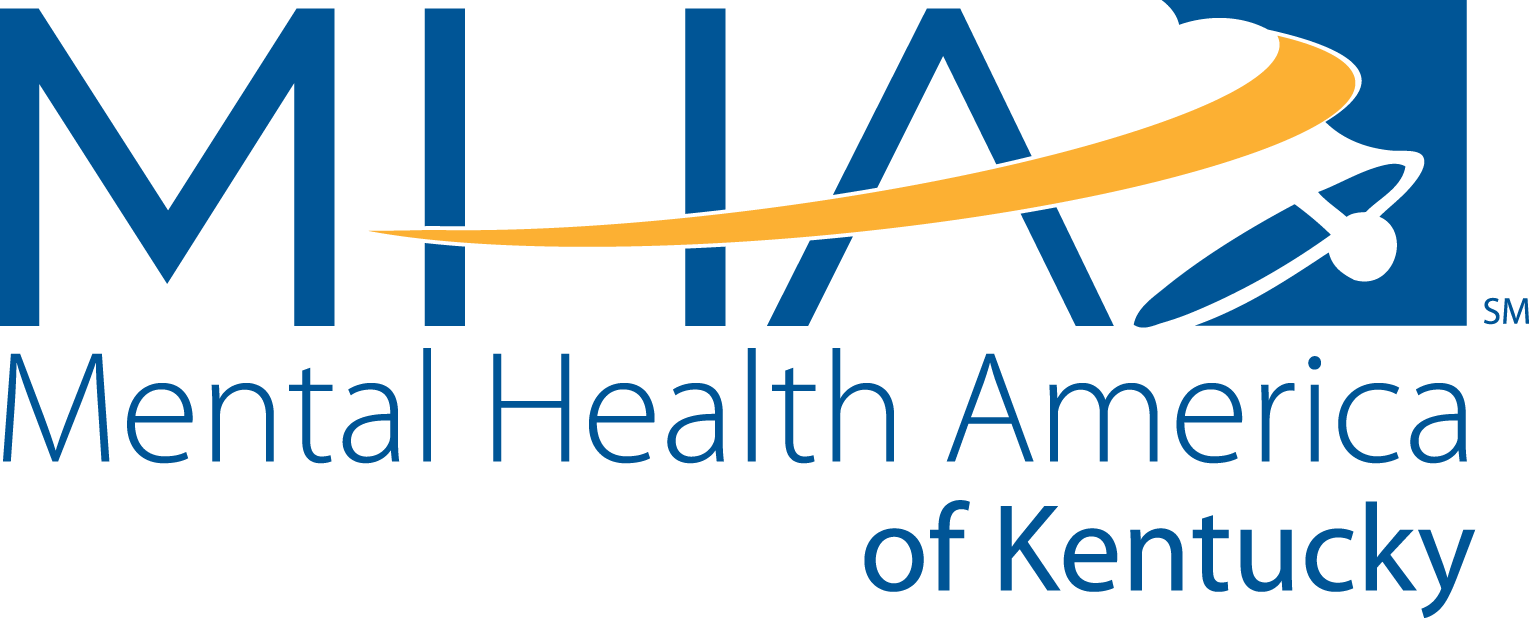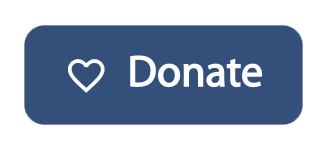- People who enroll in local Mental Health First Aid courses learn a 5-step action plan to help loved ones, colleagues, neighbors and others cope with mental health or substance use problems.
- Similar to traditional First Aid and CPR, Mental Health First Aid is help provided to a person developing a mental health problem or experiencing a crisis until professional treatment is obtained or the crisis resolves.
- Mental Health First Aid is an evidence-based public education and prevention tool – it improves the public’s knowledge of mental health and substance use problems and connects people with care for their mental health or substance use problems.

What is Mental Health First Aid?
Why do we need Mental Health First Aid?
Overall
• Nearly one in five U.S. adults lives with a mental illness (44.7 million in 2016). (National Institute of Mental Health via the National Survey on Drug Use and Health and the Substance Abuse and Mental Health Services Administration)
• In 2016, an estimated 10.4 million adults (4.2 percent) in the U.S. had a serious mental illness (SMI). (National Institute of Mental Health via the National Survey on Drug Use and Health and the Substance Abuse and Mental Health Services Administration)
Suicide
• 44,965 Americans die by suicide every year. (American Foundation for Suicide Prevention)
• For every suicide, 25 people attempt suicide. (American Foundation for Suicide Prevention)
• There are 123 suicides a day on average. (American Foundation for Suicide Prevention) • The overall suicide rate rose by 24 percent from 1999 to 2014. (Centers for Disease Control and Prevention)
Depression
• In 2016, an estimated 16.2 million adults (6.7 percent) in the United States had at least one major depressive episode. (National Institute of Mental Health via the Substance Abuse and Mental Health Services Administration)
• During 2013–2016, 8.1 percent of Americans aged 20 and over had depression in a given two-week period. (Centers for Disease Control and Prevention)
• About 80 percent of adults with depression reported at least some difficulty with work, home and social activities because of their depression. (Centers for Disease Control and Prevention)
Anxiety
• Each year, anxiety disorders affect 40 million adults in the U.S. aged 18 and older, or 18.1 percent of the population. (Anxiety and Depression Association of America)
• An estimated 31.1 percent of adults in the U.S. experience an anxiety disorder at some time in their lives. (National Institute of Mental Health via Harvard Medical School)
• Anxiety disorders are highly treatable, yet only 36.9 percent of those experiencing them receive treatment. (Anxiety and Depression Association of America)
Substance Use
• From 1999 to 2016, more than 630,000 people died from a drug overdose. (Centers for Disease Control and Prevention)
• Approximately 66 percent of the more than 63,600 drug overdose deaths in 2016 involved an opioid. (Centers for Disease Control and Prevention)
• On average, 115 Americans die every day from an opioid overdose. (Centers for Disease Control and Prevention) • The number of heroin users in the United States jumped from 404,000 in 2002 to 948,000 in 2016; a 135 percent increase. (CNN via National Institute on Drug Abuse) • In 2018, the U.S. surgeon general issued an advisory recommending that Americans carry the opioid overdose-reversing drug, naloxone. A surgeon general advisory is a rarely used tool to convey an urgent message. The last advisory issued by the surgeon general, more than a decade ago, focused on drinking during pregnancy. (CNN) • An estimated one out of every eight Americans has an alcohol disorder. (CNN via JAMA Psychiatry)
Infrastructure
• On average, only 3 percent of a government’s health budget is spent on mental health programs. (World Health Organization)
How much time does it take?
Classes used to be a solid 8 hours of instruction.
In April 2020, MHFA adopted a hybrid model where 2 hours of online self-directed pre-work instruction is paired with 6 hours of in-person class instruction time.
In June 2020, MHFA adopted a fully virtual model as a response to the COVID19 pandemic. This contains the same 2 hours of self-directed pre-work and then 6 hours of instructor-led Zoom training. MHA Kentucky has adopted this as our preferred model of training at this time.
How much does it cost?
This course is offered to residents of and employees in Kentucky for $40 and those outside of Kentucky for $50. Course costs have been reduced from the expected rate of $175.
To apply for a course scholarship, please email Marcie Timmerman with MHFA SCHOLARSHIP as the subject line. A limited number of scholarships are available from the Department of Behavioral Health, Developmental and Intellectual Disabilities via SAMHSA.
How do I register?
We’ve made it easier to register! Click on the link embedded by the date of the course you’d like to sign up for. All 2023 trainings are VIRTUAL until or unless otherwise noted. Participants are required to have enough bandwidth to use the Zoom interface, must be able to be visible via web camera and utilize a microphone.
We have not certified CEUs in Kentucky, but most medical boards and even some professional boards have been known to accept this training toward continuing education hours. If you have questions regarding CEUs or experience problems with registration, please don’t hesitate to email us.
2023 Mental Health First Aid Courses
Have a group you’d like to train all at once? Contact us to schedule trainings outside of these dates.
May 11: Virtual Adult
July 18: Virtual Adult
September 6: Virtual Adult
October 7: Virtual Adult
December 12: Virtual Adult
Identify, Understand, And Respond
Adult Mental Health First Aid
Mental Health First Aid teaches you how to identify, understand, and respond to signs of mental illness and substance abuse disorders. This training gives you the skills you need to reach out and provide initial support to someone who may be developing a mental health or substance use problem and help connect them to the appropriate care.


